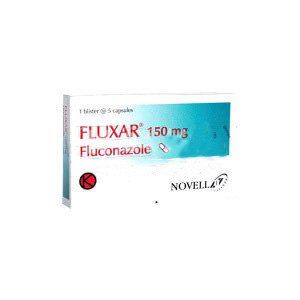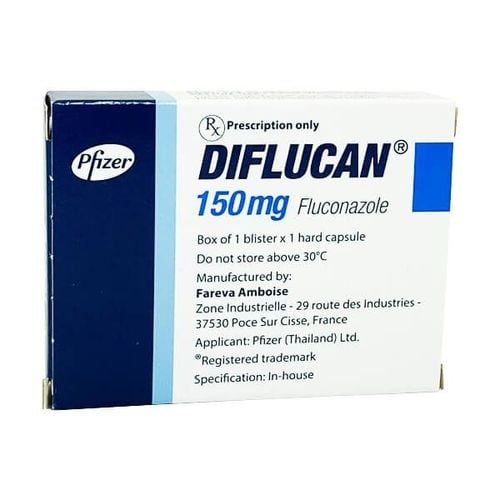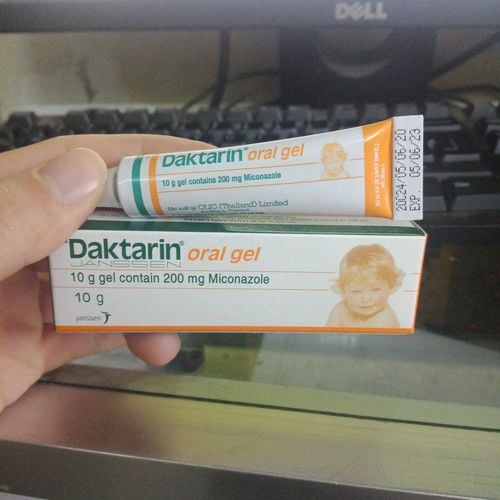This is an automatically translated article.
Fucothepharm is made in the form of hard capsules, with the main ingredient being Fluconazole. It is used in the treatment of candidiasis and certain other fungal infections.
1. What are the effects of Fucothepharm?
What are the effects of Fucothepharm? 1 Fucothepharm tablet contains 150mg of Fluconazole and other excipients. Fluconazole belongs to a new group of synthetic triazole antifungal drugs, has antifungal effects thanks to its ability to modify cell membranes, increase cell membrane permeability, release essential factors (such as amino acids, potassium) and reduce import precursor molecules (such as purines and pyrimidines precursors of DNA). Fluconazole works by inhibiting cytochrome P450 14 alpha demethylase, which prevents the synthesis of ergosterol (sterols mainly found in fungal cell membranes).
Fluconazole and other antifungal triazoles such as itraconazole have a strong affinity for the fungal P450 enzyme, and a weak affinity for the mammalian P450 enzyme. These are also more specific inhibitors of the fungal cytochrome P450 system than other imidazole derivatives such as ketoconazole. Fluconazole has no antibacterial effect.
Indications for use of Fucothepharm:
Treatment of candida infections in the mouth - throat, esophagus, vagina - vulva and other serious systemic candidiasis (candidiasis in the urinary tract, peritoneum, lung, blood and disseminated candidiasis); Treatment of meningitis caused by Cryptococcus neoformans, fungal diseases caused by Blastomyces, Histoplasma and Coccidioides immitis; Prophylaxis of Candida infections in bone marrow transplant patients undergoing radiation or chemotherapy; Prophylaxis of serious fungal infections such as Candida, Cryptococcus, Histoplasma and Coccidioides immitis in HIV-infected persons. Contraindications to using Fucothepharm:
People with hypersensitivity to Fluconazole or other components of the drug.
2. How to use and dose Fucothepharm
Usage: Orally.
Dosage:
Vaginal candidiasis: Take 1 tablet/time. In case of relapse, the dose is 1 tablet/month x 4 - 12 months; Dermatophytosis (foot fungus, body fungus, scalp fungus, inguinal fungus, skin candidiasis): Take 1 tablet/time/week x 2-4 weeks. Patients with foot fungus may require up to 6 weeks of treatment; Tinnitus : Use dose 2 tablets / time / week x 2 - 3 weeks; Toenail fungus: Use 1 tablet/time/week x 3 - 6 months for nail fungus, 6 - 12 months for toenail fungus; Cryptococcal meningitis: Take the initial dose of 2 tablets / time in the first day, then use a dose of 1 - 2 tablets / day x 6-8 weeks. Dosage for patients with renal failure: Customize according to creatinine clearance:
Clcr > 50ml/min: No need to change the dose; Clcr 11 - 50ml/min: Use 1⁄2 of the usual dose; Hemodialysis patients: Administer the usual dose after each dialysis session. Fluconazole should be administered after hemodialysis is completed because each 3-hour dialysis session reduces plasma concentrations by approximately 50%; No dosage adjustment is required in single dose therapy for vulvovaginal candidiasis. Overdose: If the clinical diagnosis is that the patient has an overdose when taking Fucothepharm, the patient should be hospitalized immediately to be carefully monitored for at least 24 hours. The doctor will monitor the clinical signs, blood potassium levels, do liver and kidney tests. If there is evidence of liver or kidney damage, the patient will be hospitalized until there are no signs of danger.
During the first 8 hours after dosing, if there are no manifestations of overdose or other unexplained clinical symptoms, the patient will no longer need active supervision. The respiratory and circulatory status should be monitored until the patient is awake, breathing normally, everything is stable. In case of serious overdose, the patient will be on hemodialysis.
3. Fucothepharm side effects
Side effects occur in about 5 - 30% of patients taking fluconazole for 7 days or longer. The rate of discontinuation due to side effects is about 1-2.8%. For women taking a single dose to treat vulvovaginal candidiasis, the rate of side effects was 26-31%. In addition, side effects are more common in HIV-infected patients than in uninfected individuals.
When using Fucothepharm, patients may experience some side effects such as:
Common: Headache, dizziness, nausea, abdominal pain, vomiting, diarrhea; Uncommon: Mild transient elevation of serum transaminases and bilirubin, rash, skin pruritus; Rare: eosinophilia, leukopenia, anemia, neutropenia, thrombocytopenia, elevated serum transaminase levels, scaly skin (common in AIDS and cancer patients) , Stevens - Johnson syndrome, fever, edema, oliguria, pleural effusion, hypokalemia, hypotension, anaphylaxis, etc. Patients should immediately inform their doctor about the side effects they may experience. must when using Fucothepharm to have the most appropriate treatment.
4. Be careful when using Fucothepharm
Some notes patients need to remember before and while taking Fucothepharm:
Be careful when using Fucothepharm in people with impaired kidney or liver function; To date, there are no adequate studies on the use of fluconazole in pregnant women. However, there have been reports of increased risk of congenital malformations in multiple parts of the infant in mothers receiving high doses of fluconazole (400-800 mg/day) for the treatment of fungal infections caused by Coccidioides immitis during the first trimester of pregnancy. Therefore, fluconazole should be used during pregnancy only if the benefits outweigh the risks, as approved by the physician; Fluconazole is secreted into breast milk at concentrations similar to those in plasma, so nursing mothers should not use this drug.
5. Fucothepharm drug interactions
Some drug interactions of Fucothepharm include:
Concomitant administration of fluconazole (200mg/day) with rifabutin (300mg/day) and rifampicin to HIV-infected patients will increase the concentration of rifabutin and its major metabolite in the blood. soy sauce; Concomitant use of fluconazole with zidovudine will interfere with the metabolism and clearance of zidovudine. Fluconazole may increase the AUC, peak plasma concentrations and terminal elimination half-life of zidovudine in HIV-infected patients; Concomitant administration of fluconazole with coumarin anticoagulants such as warfarin will increase prothrombin time. Therefore, it is necessary to monitor prothrombin time carefully when these two drugs are used concurrently; Concomitant use of fluconazole with cyclosporin may increase cyclosporin plasma concentrations, particularly in renal transplant patients. Therefore, plasma concentrations of cyclosporin should be carefully monitored in patients receiving fluconazole, and the dose of cyclosporin should be adjusted accordingly; When used concurrently, Fluconazole can increase plasma concentrations of astemizol, causing dangerous cardiovascular events such as arrhythmia, cardiac arrest, palpitations, fainting and death; Concomitant administration of fluconazole with cisapride may increase plasma concentrations of cisapride. Patients should be carefully monitored if these two drugs are used concurrently; Concomitant administration of fluconazole and phenytoin increases plasma phenytoin concentrations and phenytoin AUC, leading to phenytoin toxicity. Therefore, extreme caution should be exercised when these two drugs are used concurrently; Concomitant administration of fluconazole with sulfonylurea antidiabetic agents such as tolbutamide, glipizide or glyburide may increase plasma concentrations and decrease metabolism of antidiabetic drugs; When administered concurrently, fluconazole may increase serum theophylline concentrations and lead to toxicity. Therefore, patients should be monitored for theophylline levels and administered with extreme caution to avoid toxic doses of theophylline. When prescribed Fucothepharm, in order to avoid drug interactions, patients should inform their doctors about all drugs they are taking, and any medical conditions they have/are suffering from. At the same time, patients should strictly follow the instructions of the doctor during the course of taking the drug, do not arbitrarily change the dose, use, time of use, ... to avoid the risk of dangerous events. .
Follow Vinmec International General Hospital website to get more health, nutrition and beauty information to protect the health of yourself and your loved ones in your family.
Please dial HOTLINE for more information or register for an appointment HERE. Download MyVinmec app to make appointments faster and to manage your bookings easily.













